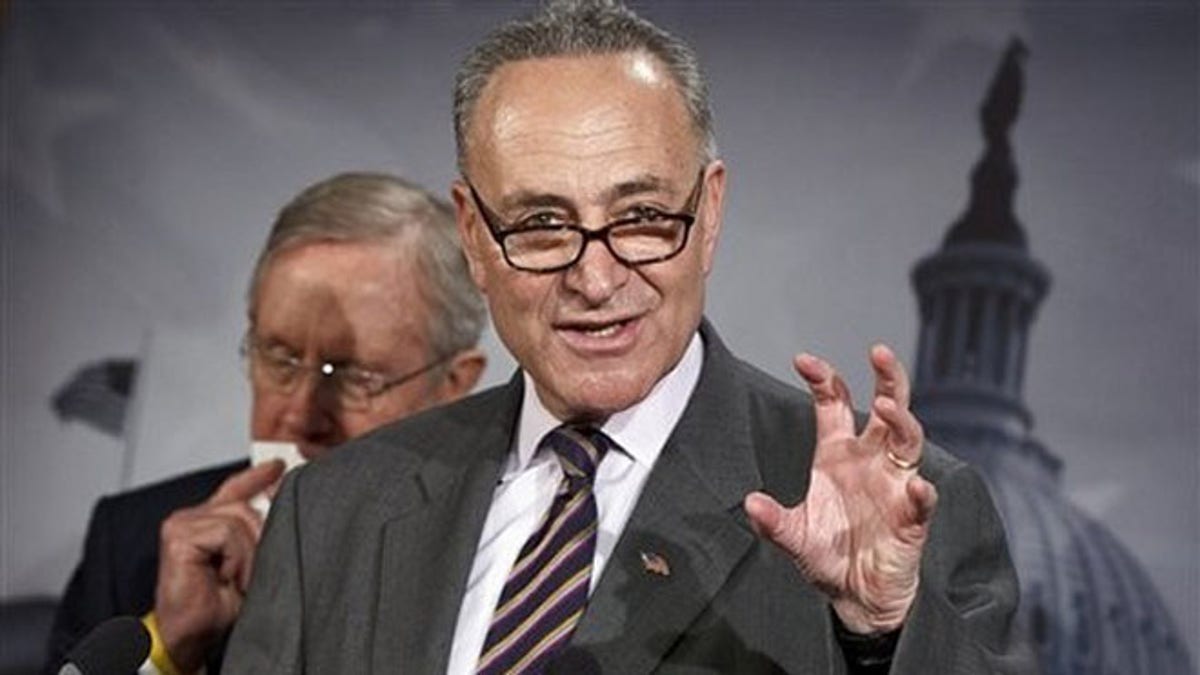
FILE: March 8, 2012: Sen. Charles Schumer gestures during a news conference on Capitol Hill in Washington. (AP)
Senate Democrats will vote this year on a constitutional amendment that would overturn two Supreme Court rulings on campaign contributions and expenditures, limiting the ability of federal candidates to raise and spend money.
Sen. Chuck Schumer, D-N.Y., said Wednesday that the Senate would schedule a vote on the constitutional amendment proposed by Sen. Tom Udall, D-N.M. The measure also would also limit the ability of super PACs to impact elections.
“The Supreme Court is trying to take this country back to the days of the robber barons, allowing dark money to flood our elections,” Schumer, who chairs the Senate Rules Committee, said at a hearing on campaign finance reform.
Recent Supreme Court rulings have permitted individuals and corporations to write unlimited checks to independent political committees, while other groups can accept cash and disclose the donors' identities months or years later, if ever.
Udall's amendment would not dictate specific policies or regulations, but would allow Congress to pass campaign finance reform legislation that "withstands constitutional challenges," Schumer's office said in a news release.
Changes to the Constitution are difficult and the vote was more political than practical. The vote, however, would force Republicans to either defend unlimited money in campaigns or put them in the awkward position of condemning their allies.
“Free and fair elections are a founding principle of our democracy, but the Supreme Court's rulings have ensured that they are now for sale to the highest bidder," Udall said. "It's now crystal clear that we need a constitutional amendment to restore integrity in our election system."
Wednesday's Senate Rules Committee hearing was the first since the Supreme Court's ruling that lifted limits on how much total money individual donors can give to candidates. The court left in place a limit on how much individual candidates can take from each donor, but the justices cleared the way for donors to give the maximum amount to every candidate on the grounds that restrictions limit free speech rights.
Campaign donations pay for ads, of course. But that money also pays for polling, operatives' salaries and offices — the nuts and bolts of a campaign operation that aren't necessarily speech.
In 2010, the court split 5-4 in the Citizens United case to free corporations and labor unions to spend as much as they wish on campaign advocacy, as long as it is independent of candidates and their campaigns. That decision did not affect contribution limits to individual candidates, political parties and political action committees.
Former Supreme Court Justice John Paul Stevens, a critic of his former colleagues' decisions that have opened the floodgates for unlimited donations and super PACs, urged the Senate Rules Committee to rein in campaign spending.
"While money is used to finance speech, money is not speech. Speech is only one of the activities that are financed by campaign contributions and expenditures. Those financial activities should not receive precisely the same constitutional protections as speech itself," Stevens said. "After all, campaign funds were used to finance the Watergate burglary, actions that clearly were not protected by the First Amendment."
Stevens told the panel that campaign finance "is not a partisan issue" and that the First Amendment does not limit "Congress or any state from imposing reasonable limits on the amount of money" that candidates or their supporters may spend.
Democrats have criticized the new rules and those who take advantage of them, including some of their allies. Republicans, meanwhile, have embraced the system and used the rules to power well-funded groups such as Americans for Prosperity.
"Let's stop demonizing citizens who exercise their First Amendment rights," said Sen. Pat Roberts of Kansas, the top Republican on the panel. "The First Amendment does not allow us to silence those who oppose us."
Countered Democratic Sen. Tom Udall of New Mexico: "Money and speech are the same thing? This is tortured logic."
The Karl Rove-supported American Crossroads super PAC raised almost $5.2 million last month from three organizations and 21 individuals. The average donation was more than $218,000. The largest donation — $2 million — came from former Univision owner Jerry Perenchio. A trust tied to Oklahoma coal executive Joseph Craft III gave $500,000, as did Arkansas-based investment manager Warren Stephens and Kentucky-based self-storage mogul B. Wayne Hughes.
Fred Eychaner, the founder of Chicago-based Newsweb Corp., wrote a $4 million check to the Senate Majority PAC, a Democratic group with ties to Senate Majority Leader Harry Reid. The group raised $11 million during the first three months of the year, including $2 million from James Simons, founder and chairman of investment firm Renaissance Technologies.
The Associated Press contributed to this report.




